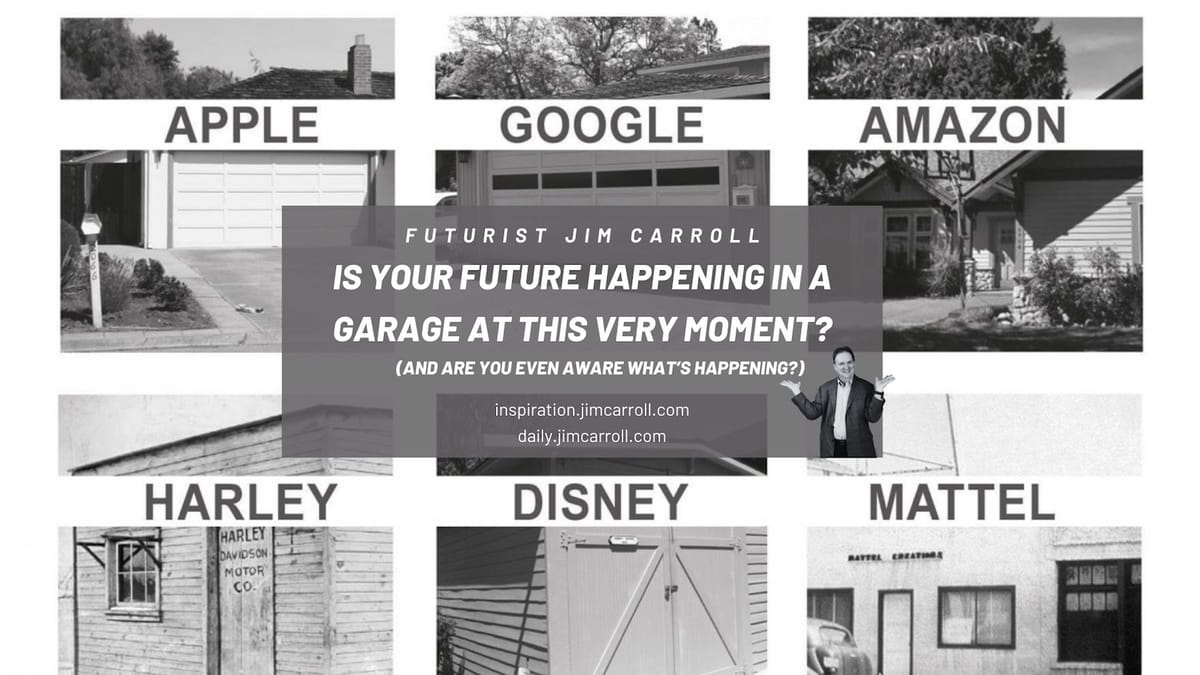"Is your future happening in a garage at this very moment? (And are you even aware what's happening?)" - Futurist Jim Carroll
We live in disruptive, transformative times, in which new companies are developing new products and services that might displace legacy organizations. Some of them might be working at this very moment in the ubiquitous 'garage,' and are set to become tomorrow's billion-dollar company before you know it.
As I cautioned my audience yesterday at a senior leadership meeting:
"At this very instant in time, there might be someone working in a garage with a blindingly disruptive idea, and in 5 years, they will have completely changed your market, your product, and your future. Are you aware of who they might be? Or even more important - shouldn't YOU be the company in the garage?"
The fact is, many successful companies were born in people's dorm rooms, garages, and basements - using this space as a launch pad until they were able to outgrow their early, innovative roots.
Amazon? It began as an online online book store in Jeff Bezos' garage. Mark Zuckerberg established Facebook in his university dorm room. Larry Page and Sergey Brin started Google in a garage, working on a search engine idea. Steve Jobs and Steve Wozniak started Apple in a garage, developing the Apple 1, before going on to become a computer company that saw explosive growth with the Apple II line. Bill Gates and Paul Allen established Microsoft in a small garage in Albuquerque, New Mexico before exploding into growth in Washington state; Bill Hewlett and Dave Packard started HP in a one-car garage in Palo Alto, California, working on various electronic products; Michael Dell started Dell in his dorm room while studying at the University of Texas at Austin, selling computers out of this room. Walt Disney and his brother Roy Disney started their company in their uncle's garage, initially producing a series of live-action/animated films. Elliot Handler and his wife Ruth started Mattel in a garage, initially making picture frames, but later shifted to producing dollhouse furniture and toys.
Need I go on?
What is it about 'garage-based innovation' that is so successful? Why do so many disruptive upstarts seem to start in such a small space?
The obvious issue is funding, of course - there's little overhead to doing something on your home turf, leaving more funds for product development. And yet, the 'garage phase' of innovation is common for several other reasons, including the fact that it can simply be an ideal space for creativity and experimentation, as the founders are not yet confined by the strictures of formal office space. It's become symbolic of innovation: the garage symbolizes the spirit of innovation and the humble beginnings of these successful companies, inspiring other entrepreneurs to pursue their ideas with determination and creativity. The lack of a formal setting gives the startup more flexibility and adaptability, allowing the founders to pivot quickly and respond at a fast pace to any new ideas that might grab their attention. And then there is the inevitable privacy and security aspect - it's simply a secure space for budding ideas to flourish without the distractions and public access of a formal office.
The key thing about 'garage-based innovation,' though, is this is where new ideas can flourish without the strictures of corporate culture, the walls of organizational sclerosis, and the boundaries of restricted thinking set by the legacy of expectations. A company that is not yet established does not yet have the established set of barriers that get in the way of the free flow of ideas. And it is in that context that new, disruptive ideas that can transform markets are truly born.
My challenge to my audience at a leadership event is to consider several questions, first and foremost of which is "Who might be working away in the garage that might come up with the ideas that will disrupt and transform the industry?" What ideas are they pursuing that you, as a legacy organization, are not considering, And can you think and innovate in the same free-flowing, unrestricted way that the 'garage-based innovator' can?
In other words, can you be the garage?
That's not an easy thing to do by any stretch of the imagination, but the key idea is that you need to be aware that at this very moment, your future might be being determined in a garage somewhere. Be cognizant of it, wary of what it represents, and refuse to rest on the legacy of your laurels.
Be the garage - don't be the one impacted by the garage!
Futurist Jim Carroll regularly challenges leadership teams, at events worldwide, on the need to think big and bold about the disruptive trends emerging in garages around the world. This post was based on his remarks at an event yesterday in Dublin.

